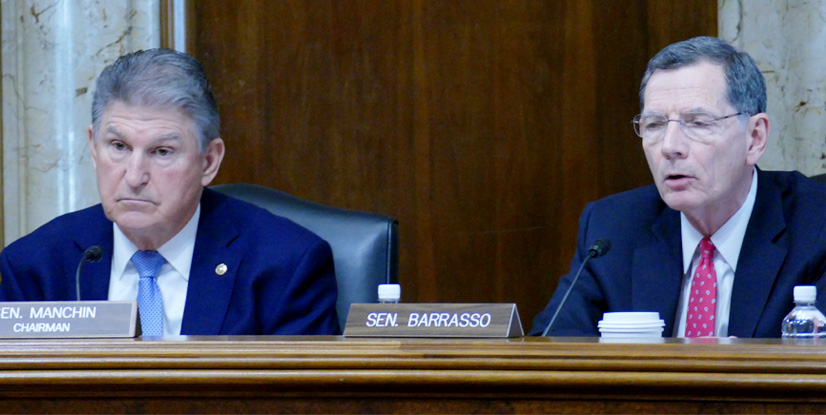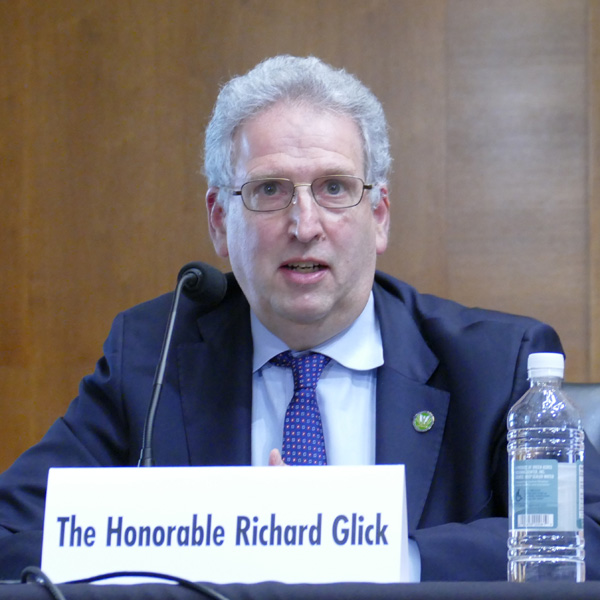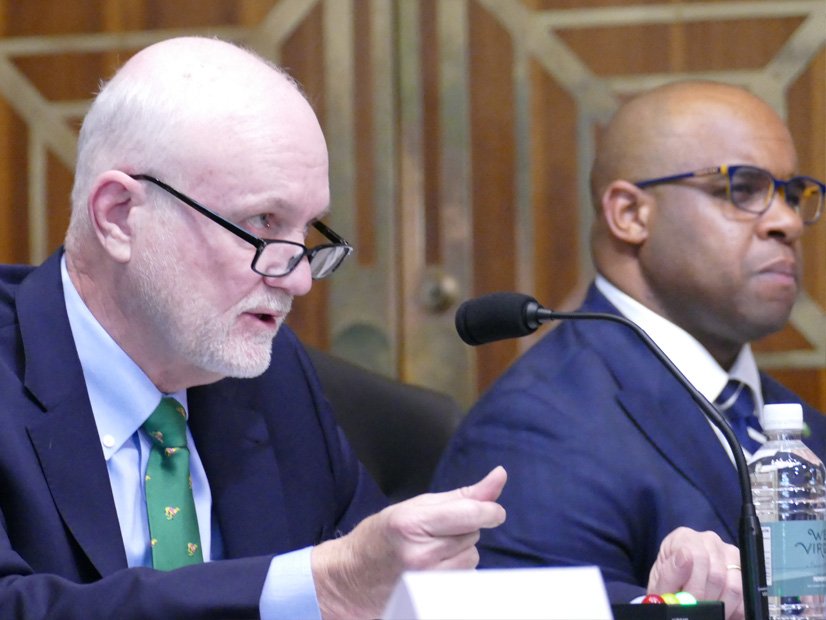
WASHINGTON — FERC Chairman Richard Glick told Congress Thursday he has no regrets over the natural gas policy statements a split commission issued last month, rejecting criticism that he had overstepped the agency’s authority and increased uncertainty for developers.
FERC voted 3-2 along party lines on Feb. 17 to update its 1999 policy statement on natural gas infrastructure certificates (PL18-1) and release guidance on how it will evaluate the impacts of projects’ greenhouse gas emissions in its environmental analyses (PL21-3). (See Split FERC Updates Policies on Gas Infrastructure Applications.)
Glick defended the policy statements during a two-hour hearing before the Senate Energy and Natural Resources Committee, where Chairman Joe Manchin (D-W.Va.) and his Republican colleagues accused FERC’s Democratic members of pursuing a partisan climate agenda that undermined U.S. energy security.
Glick and his fellow Democratic commissioners, Allison Clements and Willie Phillips, said the statements were needed because projects have been remanded or vacated by federal courts because of insufficient environmental analyses by regulators, including FERC.
‘Beyond the Pale’
An angry Manchin opened the hearing by accusing FERC’s Democrats of “elevat[ing] environmental considerations above American energy reliability, security and independence.” After the hearing, Manchin joined Republicans and Democrats in both the House and the Senate to announce a bill that would bar the importation of Russian crude oil, petroleum products, LNG and coal until the country ends its invasion of Ukraine.
“To … put up barriers to natural gas projects and the benefits they provide, while Putin is actively and effectively using energy as an economic and political weapon against our allies is just beyond the pale,” Manchin said. “If we could actually get natural gas infrastructure built it would not only help with the energy transition, here at home that would also help keep costs down for American families, create good-paying jobs, and strengthen our ability to use energy as a geopolitical tool to fight for our values abroad and support our strategic partners.”
 Sen. Joe Manchin (D-W.Va.), chair of the Senate Energy and Natural Resources Committee, left, and ranking member Sen. John Barrasso (R-Wy.) | © RTO Insider LLC
Sen. Joe Manchin (D-W.Va.), chair of the Senate Energy and Natural Resources Committee, left, and ranking member Sen. John Barrasso (R-Wy.) | © RTO Insider LLC
Republicans followed with their own fusillade, with Sen. Steve Daines (R-Mont.) accusing the FERC of “kneecapping energy providers,” and Sen. Mike Lee (R-Utah) saying the commission was pursuing a “radical climate agenda [that] makes us more vulnerable to attack.”
“These policies are going to make it next to impossible to build any new natural gas infrastructure or upgrade our existing facilities in the United States,” said ranking member Sen. John Barrasso (R-Wy.). “These orders were among the chief objectives of Commissioner [Allison] Clements’ former employer, a group with a mission to block pipelines.” Clements worked for a decade at the Natural Resources Defense Council.
 FERC Commissioner James Danly (R) | © RTO Insider LLC
FERC Commissioner James Danly (R) | © RTO Insider LLCRepublican commissioners James Danly and Mark Christie, who had dissented on the policy statements, also were critical.
Danly said the majority put “far too much weight on a handful” of narrow court rulings and said the new policy would cause reliability problems for the electric grid.
Christie said he would have agreed to reduce the reliance on precedent agreements between corporate affiliates to prove the need for pipeline capacity and to measures guaranteeing due process to property owners and communities.
“On the contrary, what the majority did was essentially assume it had the power to rewrite both the Natural Gas Act (NGA) and the National Environmental Policy Act (NEPA) under the rubric of addressing climate change,” he said. “But that is a power that this commission does not have; only you — the elected legislators in Congress — have that power and you have not delegated that power to us.”
Glick: No Agenda
Glick said the majority made its decisions “based solely on the applicable law and the facts in the record,” insisting, “I have no other agenda.”
“The D.C. Circuit has spoken on several occasions, and unless the court’s interpretation is reversed, we have no choice but to follow with unambiguous guidance,” he said.
 FERC Chair Richard Glick (D) | © RTO Insider LLC
FERC Chair Richard Glick (D) | © RTO Insider LLCThe commission received defenses from the panel’s Democrats and Independent Sen. Angus King (I-Maine).
Sen. Mazie Hirono (D-Hawaii) said it was “outrageous” that the commission had relied on contracts between corporate affiliates.
King recalled having to comply with environmental regulations while seeking a permit for a 2 MW hydropower project. “We had to do environmental analysis of wetlands; we had to work with U.S. Fish and Wildlife; we had to look at the effects on the water surrounding the project and fish passage and all of those issues,” he said. “And here we are saying that the FERC can’t require the examination of the most serious environmental threat that this country and world has ever faced — I think that’s preposterous.”
King said critics had made a case for FERC to work with stakeholders to clarify the order and reduce uncertainty. But, he added, “the fundamental premise is that this is an environmental impact. Methane is 80 times worse than CO2. And it’s the low hanging fruit of climate change.”
More or Less Uncertainty?
Glick said he was confident that the policy statements “will lead to project orders that are more legally durable.
“I think developers of energy infrastructure would agree that when regulatory agencies ignore judicial directives, or cut corners, the courts typically vacate permits and send the agencies back to the drawing board. This often adds a significant amount of time and hundreds of millions, if not billions, of dollars of additional costs onto a project.”
But Republicans said the commission’s actions would increase litigation and chill investments, with Barrasso citing a letter of complaint from Alan Armstrong, CEO of Williams Co., which transports about 30% of the natural gas in the U.S.
 FERC Commissioners Mark Christie (R) and Willie Phillips (D) | © RTO Insider LLC
FERC Commissioners Mark Christie (R) and Willie Phillips (D) | © RTO Insider LLC
“There is no question that it will be wielded against every major natural gas project, future or pending, making the costs and uncertainties of even pursuing a project exponentially more daunting,” said Christie.
He said the majority was disingenuous in suggesting the statements were consistent with the commission’s prior handling of environmental impact analyses. “To compare drainage mitigation going through a wetland to ‘Oh, you’ve got to mitigate global climate change … that is a massive, massive step difference.”
Christie said he was certain that some licenses will be approved under the new policy but said they represented a “Potemkin Village.”
“I think what we’re going to see is the deterrent factor is so great, I think you’re going to see a lot of applications that are never going to get even proposed. And maybe that’s the point. Because who can raise $6 to $8 billion of risk capital based upon a standard that says, ‘try your luck.’”
Under questioning from Sen. Bill Cassidy (R-La.), Glick said the new policy would only require developers to mitigate fugitive gases associated with the pipeline’s construction and operation. But Danly said the statement goes far beyond that in “encouraging” mitigation of downstream emissions.
“It is, in my opinion, a classic case of doing indirectly what cannot be done directly,” Danly said. “The general premise in this shows you my judicial minimalist streak: Every time you get a multi-factor balancing test that is going to be done on a case-by-case basis by an administrative agency, what you effectively have is derogation of power to pick winners and losers at the whim of the decision maker. And that will be the case here, where I predict that you’re going to see favored parties being given the nod and those who aren’t will have their applications rejected.”
Looking Forward
Sen. John Hickenlooper (D-Colo.) said the issues raised by the pipeline debate are “similar to the issues we’re facing around [electric] transmission.
“Maybe it’s time that we get around the table and just discuss the legislative solution to gas and transmission at the same time,” he said, “because we really are running out of time” to address climate change.
Barrasso suggested Congress could seek to undo the policy under the Congressional Review Act.
“I’m now starting to think that perhaps we would be better off without FERC — which having been created by Congress, can be eliminated by Congress,” said Lee. “Perhaps it should.”
In an interview after the hearing, Glick said he had no regrets about how the commission issued the policy statements. “We have to move. These orders are sitting here,” he said.
“As I said before, give us some time. Let us pursue these orders. … And if you still don’t like it, call me back and scream at me some more. I’m going to take it, but at least see how we implement the policy statements.”



